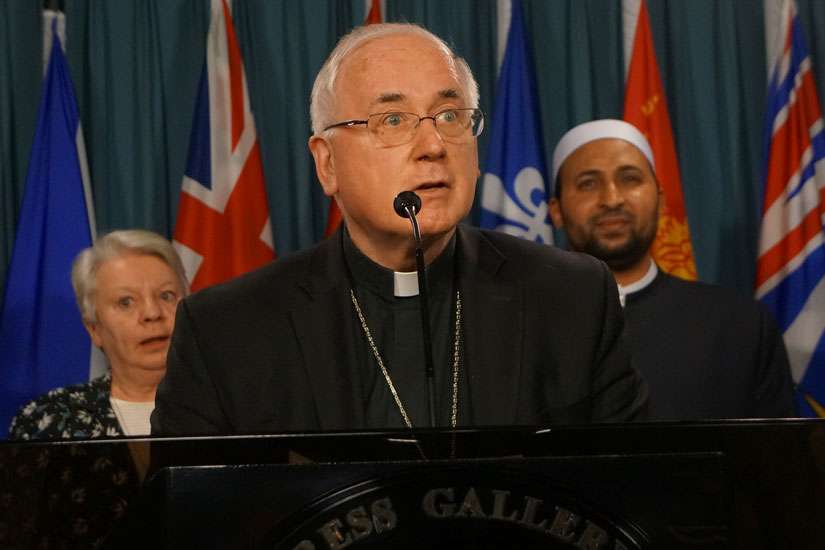At a news conference on Parliament Hill Oct. 29, a joint statement on euthanasia and assisted suicide was released by the Canadian Conference of Catholic Bishops and the Evangelical Fellowship of Canada. The declaration garnered the support of more than 30 Christian denominations together with more than 20 Jewish and Muslim leaders from across the country.
The statement insists that Canada’s “health care systems must maintain a life-affirming ethos. Medical professionals are trained to restore and enhance life,” and “any action intended to end human life is morally and ethically wrong.” Canada’s legislators are urged “to enact and uphold laws that enhance human solidarity by promoting the rights to life and security for all people; to make good-quality home care and palliative care accessible in all jurisdictions; and to implement regulations and policies that ensure respect for the freedom of conscience of all health-care workers and administrators who will not and cannot accept suicide or euthanasia as a medical solution to pain and suffering.”
Parliament has until Feb. 6, 2016 to craft a new law in line with the Supreme Court of Canada’s Carter decision earlier this year that struck down Criminal Code provisions against assisted suicide.
Ottawa Archbishop Terrence Prendergast, representing the Canadian bishops, said “the Catholic Church believes and teaches that suicide is contrary to justice, hope and charity.”
The faith leaders were challenged at the news conference by journalists who noted the apparent contradiction of faith groups uniformly opposed to assisted suicide and euthanasia now requesting a national conversation in coming up with a new law.
Prendergast said he personally would prefer there be no assisted suicides or euthanasia in Canada. But “Canada is a democratic society,” he said. If no law is crafted with as many safeguards as possible, the archbishop said he feared the same legal and regulatory vacuum around abortion would become the norm. If there were no rules or regulations, soon even teenagers might request assisted suicide, he said.
While the groups would accept “regretfully” that some citizens might opt for some type of assisted death, “we would like to have protection of life to the greatest extent possible,” including the option of palliative care so people will not feel forced to make a choice for assisted death, he said.
Sr. Nuala Kenny, a bioethicist and retired pediatrician, said, “As of the moment, in fact, (doctor-assisted death) is legal.” If no legislation is in place by the court’s deadline, Canada “will have the most liberal end-of-life policy in the world” and it will not only concern those who have terminal illness or who are dying, she warned.
Asked if the Liberals were perceived as less open to faith groups’ concerns, the archbishop pointed out that Prime Minister-designate Justin Trudeau “eliminated all people who were pro-life on abortion” from running as candidates in the last election. “This is a life issue,” he said.
The faith leaders said they welcomed news the Trudeau government planned to seek an extension from the Supreme Court to give Parliament more time to craft a new law. They urged as wide a consultation as possible.
Rabbi Reuven Bulka from Ottawa’s Congregation Machzikei Hadas said there needs to be a conversation to develop a Canadian consensus because the right to an assisted death is being imposed on others who must assist.
Suicide is “an epidemic across the democratic free world,” he said. “To say ‘you have to help me in doing it’ ” is “the big quantum leap” that would “transform medicine” in a way that has never been seen since its beginnings.
“None of us want to impose our particular religious values,” Bulka said. Instead, the faith leaders hope Canada will take into consideration the protections that have built Canadian society based on the sanctity and inviolability of human life.
Julia Beazley, policy analyst for the Evangelical Fellowship of Canada, said any new law has to ensure those opting for doctor-assisted death are “capable and competent,” and that ill and disabled citizens are protected from third-party coercion


